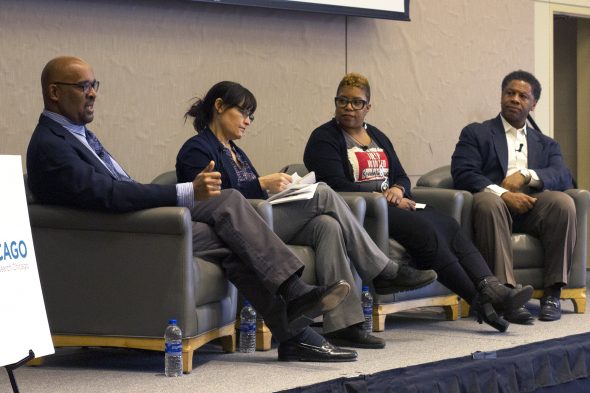Campus Conversation highlights health disparities

Campus Conversation panelists included Wayne Giles (from left), moderator Amanda Lewis, Angela Odoms-Young and Robert Winn. (Photo: Carley Mostar)
West Garfield Park and Chicago’s Loop are a 20-minute drive apart, but when researchers map life expectancies at birth for these areas, the numbers take a dive in the wrong direction.
Loop residents are expected to live until they’re 85. West Garfield Park residents, 69.
What causes this 16-year gap?
For the fifth Campus Conversation of the year, expert speakers explored this topic and addressed other social determinants of health in a talk titled, “What are Chicago’s Health Disparities, and Why Does it Matter?” Amanda Lewis, director of the UIC Institute for Research on Race and Public Policy (IRRPP), moderated the event’s panel. Panelists included Wayne Giles, dean and professor for the School of Public Health; Angela Odoms-Young, associate professor of nutrition; and Robert Winn, associate vice chancellor for community-based practice and director of the UI Cancer Center.
Lewis opened the event with an overview of an IRRPP report, “A Tale of Three Cities: The State of Racial Justice in Chicago,” which assesses the challenges Chicago residents face and examines how conditions and outcomes vary for residents from different racial and ethnic groups, namely black, Latinx and white populations. The report covers areas related to housing, economics, education, justice and health.
“One of the big conclusions in our report is that far more Chicagoans are impacted every day by the effects of structural violence than by the impact of interpersonal violence,” said Lewis, before adding that the new Center for Health Equity Research, or CHER, is helping to address the issue.
She then highlighted key data points to demonstrate how structural racism and violence lead to inequalities and negative health outcomes. Large gaps in unemployment and wealth rates were some examples. Lewis also touched on prison overcrowding and how more state spending goes to corrections and police rather than domains directly related to health.
Panelists offered some solutions.
Winn, professor of medicine, shared his thoughts about harnessing the power of new technologies and being mindful of their dangers, too, before saying that connecting with communities in meaningful ways is the key to getting ahead.
Odoms-Young, an IRRPP fellow, brought attention to grassroots work being done on the South Side in Imani Village, a project created to empower underserved and historically disenfranchised Chicagoans.
Giles talked about mental health issues, stress and the impacts they could have on the body, which could include disability and increased risk of diabetes and heart disease. He also called for more precision in public health before stating that many topics the panel covered were not new.
“We’ve been talking about these issues for 119 years,” he said, referring to an 1899 book by W.E.B. Du Bois, the first time a systematic review of the health for communities of color was published.
How can UIC help? The answer from all experts: vote.
“Local politics matter,” said Winn.
